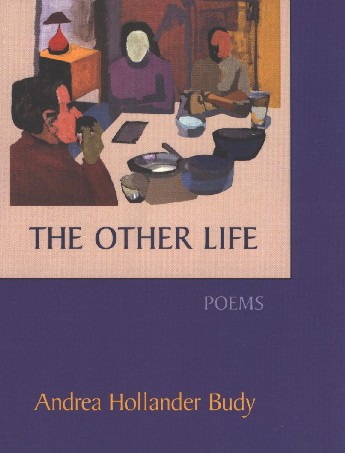|
The Other Life by Andrea Hollander Budy: A
Review
Story Line
Press, 2001. Available in Little Rock at Lorenzan and Wordsworth Bookstores. This is the second full-length book by Andrea Hollander Budy. The first, House Without a Dreamer, also published by Story Line Press, won the Nicholas Roerich Poetry Prize in 1993. She has been awarded fellowships by the NEA, the Arkansas Arts Council, and Bread Loaf and Wesleyan Writers' Conferences. She lives in Mountain View, Arkansas, and is Writer in Residence at Lyon College. In addition to the two books, she has published three poetry chapbooks with intriguing titles: What the Other Eye Sees (Wayland Press, 1991); Happily Ever After, which is a revision of well known fairy tales (Panhandler Press, 1989); and Living on the Cusp (Moonsquilt Press, 1981). The 'Other Eye' in the chapbook title refers to the imaginary third eye, which looks inward, according to some cultures (Interview, 1993). Andrea H. Budy often writes in the first person, even when the narrator is a ninety-one year old woman, or a man. The voice of each narrator seems so authentic that readers are sometimes lured into thinking that the author is speaking from personal experience, or at least from personal knowledge of someone else's experience. This is not the case in many, perhaps most, of her poems, which she alludes to in the introductory ("What the Other Eye Sees") :
and in:
Exceptions to this principle in the present volume include "Reading Aloud to My Mother," "A Tree Like This One,", "History," and "My Father's Sweater." In these poems, the voice of the narrator is that of the poet, even though the stories told may be imagined or at least enhanced for the sake of the poetry (Interviews, 1993, 2000). My best guess is that "Those Summer Sundays," "Poem Written at Home While You Fly Over the Atlantic," and possibly "The Hunters" and "Wound," also represent the voice of the poet/narrator-but it is that, an educated guess based on my personal knowledge (Interview, 1993). Most of the poems in this volume are about relationships: between father and daughter ("Those Summer Sundays, " "My Father's Sweater"); mother and daughter ("Reading Aloud to My Mother"); and relationships, often anticipated or even fantasized by the characters, between a man and a woman--other than the one he, or she, is married to. Two of the poems carry the relationship between mother and daughter back two generations (Interview, 1993). "These are A Tree Like This One", which depicts a mother and daughter picnicking under a Russian olive tree in the back yard, imagining the mother's grandparents under a similar tree on the eve of their emigration from Eastern Europe:
and the following poem, "History," which continues the daughter's reflection on her family roots, placing them in a larger historical context:
Several years ago Andrea Hollander Budy gave up a promising career in
academia to relocate in a place where she could live a simpler life and
be close to nature, a place that would allow her to nurture the poet
within. She chose Arkansas. From the window of her studio, she make[s
her] way out of that room, / that house. . . . / one word at a time
("How It Is Done"). Arkansas is the richer for that
choice.
|

